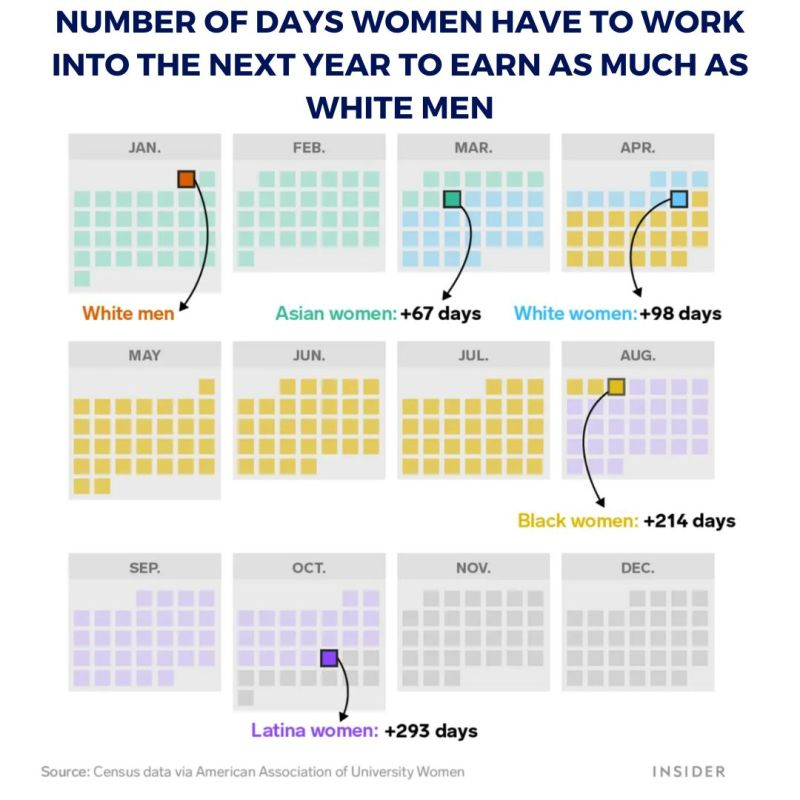Understanding Equal Pay Day and the Wage Negotiation Myths
Closing the gender wage gap to support women’s advancement
Let’s talk about Equal Pay Day. This symbolic date represents how far into the new year women had to work to catch up with what men earned the previous year. This year, March 12, 2024 marked the occasion. While it shines a light on the persisting wage gap, we have to be real – a single data point doesn’t tell the full story.
The complexities of the gender wage gap deserve some discussion. There are different Equal Pay Days for different groups of women, showing how gender discrimination gets compounded by race, parenthood, and other factors. Black Women’s Equal Pay Day lands in July, while Latina Equal Pay Day isn’t until October! These dates are a stark reminder of the intersecting barriers women face.

The AAUW 2022 pay gap update included a reminder of the long-term implications: “Women working full time in the U.S. are still paid just 84 cents to every dollar earned by men — and the consequences of this gap affect women throughout their lives. The pay gap even follows women into retirement: As a result of lower lifetime earnings, they receive less in Social Security and pensions. In terms of overall retirement income, women have only 70% of what men do.”
As we observe another Equal Pay Day, let’s dispel pervasive myths that can hamper women’s career advancement and pay equity. In their Harvard Business Review article “3 Negotiation Myths Still Harming Women’s Careers,” Kathryn Valentine and Hannah Riley Bowles address three myths that are hampering women’s potential to seize opportunities and overcome barriers in their careers. One long-standing myth is that women simply don’t negotiate as much as men for better opportunities and pay. However, the research shows otherwise – both genders face challenges going after roles and compensation outside traditional gender stereotypes.
Myth #1: Men Hustle, Women Don’t
Look, the truth is women encounter way more obstacles than men when trying to negotiate higher salaries. It’s not that they don’t try. A Harvard study found if a job posting explicitly allowed negotiating pay, women went for it just as much as men. But here’s the kicker – whether the hiring manager was a man or woman, females were looked at more negatively just for attempting to negotiate.
For real pay equality, we need to dismantle the double standards. Women should have just as much opportunity to negotiate their pay as their male counterparts, while also increasing men’s access to family-friendly policies. Negotiating better futures for yourself shouldn’t be a gender barrier course.
Myth #2: It’s Only About Pay
Another myth is that women must persistently negotiate pay to close the gender wage gap. However, the wage gap stems more from occupational segregation than equal pay for equal work. Jobs dominated by women tend to pay less on average.
While transparency around compensation is crucial, endlessly negotiating pay in your current role may only go so far. The real push needs to be paving the way for women into higher-paying careers traditionally dominated by men. We also need affordable childcare and paid family leave policies so parenthood isn’t an automatic career stall-out for mothers.
Myth #3: The Self-Advocacy Penalty
Most people hate negotiating for money. I get it, many women dread negotiating because they’re concerned that they will be perceived as pushy or aggressive. But being socially penalized for self-advocating doesn’t have to be a foregone conclusion. Companies need to get proactive about eradicating those sexist double standards.
This means educating managers on gender biases while encouraging employees of all genders to negotiate their worth – whether it’s roles, workload, pay, flexible work schedules, you name it. Re-shape that culture to empower everyone to lean in, not lean back.
How Women Can Advocate for Themselves
While companies must promote equitable practices, women can employ research-backed strategies:
- Explain why requests are appropriate based on performance data
- Share how proposals benefit the company’s goals
- Negotiate a wide range of terms beyond just pay, like roles, assignments and flexibility
Rather than avoiding negotiation, women can increase persuasiveness by explaining exactly why their requests are justified and serve the company’s interests. As Valentine and Bowles share, one woman successfully negotiated a higher role and pay by highlighting how her experience allowed her to contribute more value and drive growth strategies. It’s about making a business case for getting that raise.
By dispelling myths about negotiation and gender differences, we can create a more equitable path toward closing wage gaps. As organizations navigate the future of work, we must avoid confining women and men to antiquated gender roles that limit their opportunities. It’s time to move beyond simplistic stereotypes and toward substantive solutions for parity and creating more equitable workplaces. Equal pay and opportunity isn’t just a DEI issue, it’s an economic imperative.
Related article: Men: Make Equal Pay Day Your Epiphany Day.

